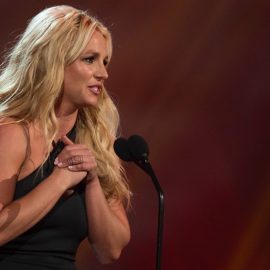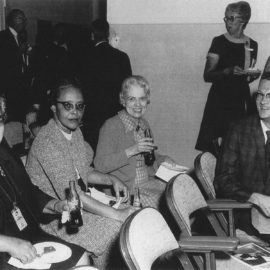

This article is an excerpt from the Shortform summary of "The Immortal Life of Henrietta Lacks" by Rebecca Skloot. Shortform has the world's best summaries of books you should be reading.
Like this article? Sign up for a free trial here .
Who was the youngest child of Henrietta Lacks? Why did Joe Lacks change his name to Zakariyya Bari Abdul Rahman? How did he handle the death of his mother?
Zakariyya Bari Abdul Rahman is the youngest child and third son of Henrietta Lacks and David “Day” Lacks. He was born Joe Lacks and changed his name in prison after converting to Islam.
Learn more about the troubled life of Zakariyya Bari Abdul Rahman.
Day and Henrietta were married in 1941, and shortly thereafter, they moved to Turner Station, a booming industrial neighborhood in Baltimore. They had three more children—David, Jr. (Sonny), Deborah, and Joe (later Zakariyya)—the last in 1950.
Joe Lacks: Murder and Imprisonment
In Baltimore, Joe—who’d earned the nickname “Crazy Joe” around the neighborhood—began to be threatened by a local man named Eldridge Ivy. One night Ivy, who was taller and heavier than Joe, beat him severely for no reason. The following evening, Joe Lacks stabbed Ivy in the chest, killing him.
Joe fled to Clover, where he drank heavily and threatened to kill members of his own family. Eventually he decided to return to Baltimore and turn himself in. He was sentenced to 15 years rather than the maximum 30—there is some indication that the judge took his psychological difficulties into account—in a medium-security prison. There, he converted to Islam and changed his name to Zakariyya Bari Abdul Rahman.
Struggles After Being Released
Zakariyya Bari Abdul Rahman was released from jail early, having served about half of his fifteen-year sentence. He was effectively homeless: His anger issues made keeping a job difficult, and he resented Day so intensely for leaving him to Ethel’s abuse that he refused to sleep in Day’s house. He would often sleep on the steps of a church across the street from Day’s; it wasn’t uncommon for Day to pass his own son sleeping on the concrete when he left the house.
Desperate for money, Zakariyya began volunteering for scientific studies at Hopkins. Among other experiments, he allowed himself to be infected with malaria to test a new drug. The researchers had no idea he was Henrietta Lacks’s son because of his new name.
Zakariyya Meets Skloot
In 2000, Deborah took Skloot to see Zakariyya Bari Abdul Rahman. Skloot was worried—she knew about Zakariyya’s history of anger, and that he was the least inclined of the Lackses to talk about his mother—but Deborah assured her that if she noticed anything wrong, she’d remove them from the situation. Along with them for the visit were eight-year-old Davon and four-year-old Alfred, Deborah’s grandsons.
Zakariyya Bari Abdul Rahman lived in an assisted-living facility—he had significant hearing loss and, without corrective lenses, he was nearly blind—where he was on probation for intimidating the other residents. He greeted his visitors in the parking lot in a surly mood: He said wasn’t ready to see them yet and smacked Davon across the face with some newspapers he was carrying for no reason. Zakariyya was average height but weighed about 400 pounds.
Zakariyya sat on a bench in front of the building and ignored his guests, who went to sit on a bench about fifteen feet away. Finally Zakariyya asked to see the Johns Hopkins Magazine article Skloot had written. Deborah informed Skloot that he wanted Skloot to be there when he read it, so Deborah took her grandkids upstairs to Zakariyya’s room and told Skloot to sit with Zakariyya Bari Abdul Rahman on his bench.
At a certain point in his reading, Zakariyya became agitated. He rose to his feet and yelled at Skloot about how the doctors stole his mother’s cells and created cures and cloned her, all without compensating—or even telling—the family. Deborah reappeared to make sure everything was OK, and the three started heading for the building entrance. As they did so, Zakariyya echoed his brothers and father: He told Skloot that Henrietta’s cells had only done good for wealthy people and that he and Deborah couldn’t even afford to see doctors.
Zakariyya’s room was spartan: Two chairs, a small TV with a VCR, a full-size bed with no sheets or pillows. On the wall were photocopied pictures of Lacks and Elsie, as well as diplomas for training in specific trades.
Once everyone was in the room, Zakariyya vented. When he began to remember what Ethel had done to him, he said, he felt like he could kill her and his father, too. He said that, even though his mother’s cells had helped people, he’d rather have had her alive to raise him.

———End of Preview———
Like what you just read? Read the rest of the world's best summary of Rebecca Skloot's "The Immortal Life of Henrietta Lacks" at Shortform .
Here's what you'll find in our full The Immortal Life of Henrietta Lacks summary :
- How Henrietta's cells became used in thousands of labs worldwide
- The complications of Henrietta's lack of consent
- How the Lacks family is coping with the impact of Henrietta's legacy







IS HE ALIVE OR DEAD?????????????????????????
idk…